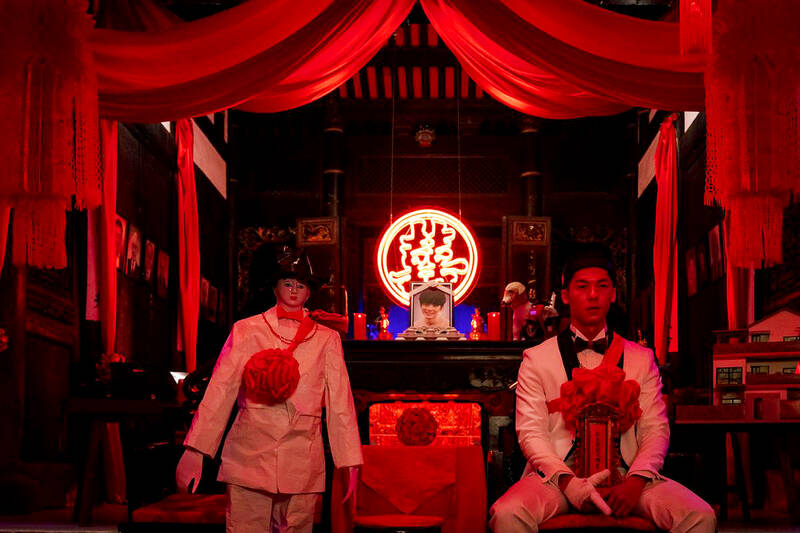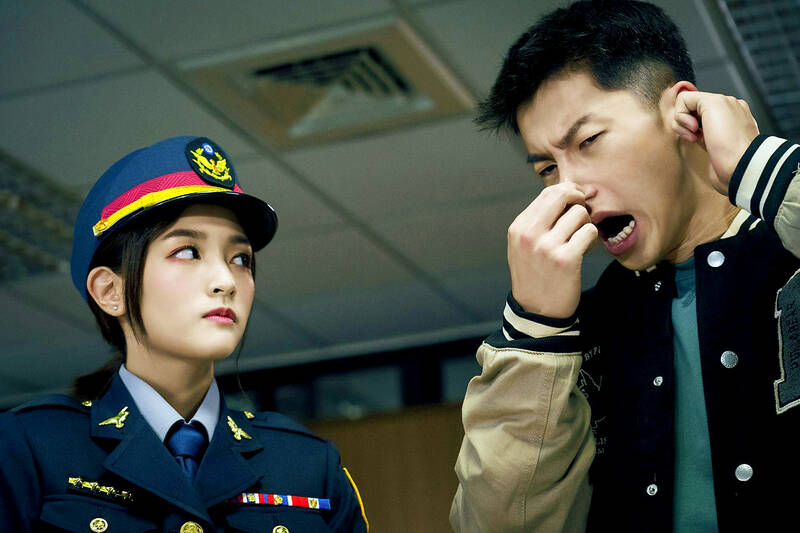It’s pretty predictable what will happen when egotistical, homophobic cop Ming-han (Greg Hsu, 許光漢) is coerced into marrying the ghost of recently deceased gay man Mao Mao (Austin Lin, 林柏宏).
While retrieving evidence a drug dealer threw out the window during an over-the-top car chase, Ming-han accidentally picks up a red envelope planted by Mao Mao’s grandmother, who hopes to find her grandson a husband in the afterlife. Ming-han does not believe in this folk practice, but after a series of mishaps befalls him that same afternoon, he reluctantly agrees to the ghost wedding and becomes the only person who can see Mao Mao’s spirit.
Based on Lai Chih-liang’s (賴致良) script, which won Best Creative Story in 2018’s Let’s Be Wild (野草計畫) screenwriting contest, the film presents an intriguing concept as both ghost weddings and gay weddings are frowned upon in society.

Photo courtesy of Calendar Studios
Anyhow, forced to spend every waking minute together, Ming-han eventually changes his views, becomes a better person and saves the day.
Sure, it’s formulaic, mainstream stuff, albeit with a uniquely Taiwanese twist, but that doesn’t mean that Marry My Dead Body (關於我和鬼變成家人的那件事) isn’t entertaining. Having delivered blockbusters such as The Tag-Along (紅衣小女孩) and The Soul (魂), director Cheng Wei-hao (程偉豪) appears to have mastered the art of making solid, commercially successful supernatural thrillers. Now he adds comedy to his resume.
The chemistry between Ming-han and Mao Mao, who angrily call each other “damned gay” and “dumb straight guy” at first, is quite warm and builds naturally. They both harbor stereotypical beliefs about people of each other’s sexual orientation, and the scenes of their daily interaction and eventual mutual understanding, while cheesy at points, are hilarious and poignant.

Photo courtesy of Calendar Studios
There’s quite a lot going on in the film, which is mainly driven by Ming-han’s attempts to catch notorious drug dealer Brother Hsiao (Tsai Chen-nan, 蔡振南) and redeem his career, while trying to help Mao Mao fulfill his lingering wishes so he can leave this world without regrets. Mao Mao promises to use his spiritual powers to help Ming-han with his tasks, but his attempts often go unexpectedly awry. Of course, the recipe always calls for a twist or two to the mystery, and despite knowing so, it was still fun and effective.
Gingle Wang (王淨) plays Ming-han’s love interest and work partner Tzu-ching, who despite being a side character, pulls her weight and allows for further examination of gender stereotypes and expectations. She tries to prove herself as a competent cop and not just a pretty face for promotional and ceremonial purposes, but some coworkers still spread rumors that she slept her way to the top.
Chosen as the closer for last year’s Golden Horse Film Festival, Marry My Dead Body is more than just a silly action-comedy; it showcases various traditional and modern Taiwanese cultural phenomena and touches upon issues ranging from same-sex marriage to environmental awareness. The film’s commercial style allows for these topics to reach a larger audience in a non-preachy, light-hearted manner, as it garnered NT$47 million in box office sales in just its first three days in theaters.
For example, Mao Mao is an active proponent of bringing one’s own containers and bags to take out restaurants, and his first request to Ming-han is to “stop global warming.” His endearing grandmother (Wang Man-Chiao, 王滿嬌) is a vocal supporter of his sexual orientation, accompanying him to the pride parade, but his stern father (Tuo Tsung-hua, 庹宗華) cannot accept it.
These two characters are also portrayed well, and contribute to the depth of the movie. One of the film’s actors will probably win an award this year for their performance.

Growing up in a rural, religious community in western Canada, Kyle McCarthy loved hockey, but once he came out at 19, he quit, convinced being openly gay and an active player was untenable. So the 32-year-old says he is “very surprised” by the runaway success of Heated Rivalry, a Canadian-made series about the romance between two closeted gay players in a sport that has historically made gay men feel unwelcome. Ben Baby, the 43-year-old commissioner of the Toronto Gay Hockey Association (TGHA), calls the success of the show — which has catapulted its young lead actors to stardom -- “shocking,” and says

Inside an ordinary-looking townhouse on a narrow road in central Kaohsiung, Tsai A-li (蔡阿李) raised her three children alone for 15 years. As far as the children knew, their father was away working in the US. They were kept in the dark for as long as possible by their mother, for the truth was perhaps too sad and unjust for their young minds to bear. The family home of White Terror victim Ko Chi-hua (柯旗化) is now open to the public. Admission is free and it is just a short walk from the Kaohsiung train station. Walk two blocks south along Jhongshan

The 2018 nine-in-one local elections were a wild ride that no one saw coming. Entering that year, the Chinese Nationalist Party (KMT) was demoralized and in disarray — and fearing an existential crisis. By the end of the year, the party was riding high and swept most of the country in a landslide, including toppling the Democratic Progressive Party (DPP) in their Kaohsiung stronghold. Could something like that happen again on the DPP side in this year’s nine-in-one elections? The short answer is not exactly; the conditions were very specific. However, it does illustrate how swiftly every assumption early in an

Snoop Dogg arrived at Intuit Dome hours before tipoff, long before most fans filled the arena and even before some players. Dressed in a gray suit and black turtleneck, a diamond-encrusted Peacock pendant resting on his chest and purple Chuck Taylor sneakers with gold laces nodding to his lifelong Los Angeles Lakers allegiance, Snoop didn’t rush. He didn’t posture. He waited for his moment to shine as an NBA analyst alongside Reggie Miller and Terry Gannon for Peacock’s recent Golden State Warriors at Los Angeles Clippers broadcast during the second half. With an AP reporter trailing him through the arena for an